 Image courtesy of Sira Anamwong at FreeDigitalPhotos.net Image courtesy of Sira Anamwong at FreeDigitalPhotos.net Contractors are usually quick to submit variation claims to the client asking for additional time and/or money. These construction claims are a result of changes and additions that the client has made to the construction works, or because the project conditions which could have been expected on the project are different (more adverse) than those actually encountered. But, sometimes the client makes changes, or there are other events, which could shorten the time the contractor takes to complete the project, or which reduces the contractor’s costs. Very few contractors voluntarily offer to provide a negative variation to the client - one which reduces the project cost or the time to complete the project. Should the client request a price or time reduction this is often met with indignation by the contractor. When Can Clients Ask for Money Back from the Contractor?Clients can ask for money back, and in some cases even a reduction in the construction duration when:
Clients can also claim money back from the contractor when:
It should be noted that in all cases the contractor should be charged a fair price and the contractor is entitled to request a breakdown of the charges and costs. When Can’t a Client Ask for Money Back from their contractor?It is important to note that the client can’t ask the contractor for money back if:
Conclusion This article was first published on the ClockShark website. To visit this website and continue reading the article click on the link above. Please share this post To read more about the author’s books and find out where you can purchase them visit the pages on this website by clicking the links below:
To read more about the author visit the page 'Paul Netscher' Want to contact Paul Netscher please enter your details on 'Contacts' Find out how Paul Netscher can help you
0 Comments
An introduction to construction claims for construction project managers Video 13 - Claims by subcontractors against the contractor Just as contractors can lodge variation claims against their clients, so to can subcontractors submit variation claims to contractors. Watch this video to learn more, and how you can avoid these claims.  Information in this video is from the author's easy to read books: 'Construction Claims: A Short Guide for Contractors' and 'Successful Construction Project Management: The Practical Guide' and 'Building a Successful Construction Company: The Practical Guide'. All available from Amazon in paper or ebook. Next week watch video 14 - The Contract Document - The Rules of the Project Please Like, Share and Comment In a previous article (Can I Claim for Additional Time on My Construction Project?) I discussed reasons that contractors can claim a delay variation on their construction project. Unfortunately, some contractors submit delay claims to which they aren’t entitled. This may be because they don’t understand the construction contract document or the basics of construction variation claims. Regrettably, some contractors are just serial claimants, claiming for anything and everything, while many submit delay claims in a desperate effort to claw back time and money which has been lost because of their poor management, and blunders that were made in planning and managing the construction project. #constructionlaw #constructionmanagement #constructionclaims #contractors Submitting construction delay claims which have no sound basis or justification is detrimental.
When Are Contractors Not Entitled to Submit a Construction Delay Claim?It is important to note that construction contract documents do vary, so it is always essential to understand what your construction contract document says. But here are some general principles. Contractors aren’t entitled to claim a delay, or for an extension of time when:
"The overlapping portion of two delays can only be claimed once." In addition, there is often more than one delay on a project. Sometimes these delays overlap, or are concurrent. The overlapping portion of two delays can only be claimed once. However, the concurrency of delays can become a complicated issue and often depends on whose fault the first delay is as to what portion of the second overlapping delay can be claimed. But this is a topic best left to the experts, or another article. Understand your contractual rights"Frivolous and spurious delay claims are a waste of time, they are an irritant to clients" Frivolous and spurious delay claims are a waste of time, they are an irritant to clients and they can impact the integrity and reputation of contractors. Contractors must understand the contract document, the construction schedule and general contractual procedures. If you are not sure about a contractual issue ask for expert advice. Wise up to your contractual rights. My book: ‘Construction Claims: A Short Guide for Contractors’ provides some useful guidance, as do many other similar books. #constructiondelayclaims #constructiondelays #changeordermanagement This article was first published on the ClockShark website. Please share this post © 2018 This article is not to be reproduced for commercial purposes without written permission from the author.  This article is compiled from information in Paul Netscher's book 'Construction Claims A Short Guide For Contractors' "An excellent, concise and very practical guide to successful claims process. This is a no nonsense approach that gets on with it." Review Amazon UK Do you want to learn how to manage construction projects successfullyTo read more about the author’s books and find out where you can purchase them visit the pages on this website by clicking the links below:
To read more about the author visit the page 'Paul Netscher' Want to contact Paul Netscher please enter your details on 'Contacts' Find out how Paul Netscher can help you An introduction to construction claims for project managers video 12 - Negative variation claims Contractors hate giving money back, but not all construction variation claims are positive and sometimes contractors may be required to give money back to the client. Learn when and why, as well as when the contractor doesn't have to give money back. 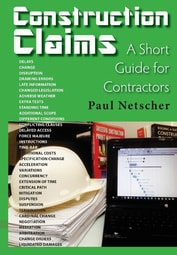 Information in this video is from the author's easy to read books: 'Construction Claims: A Short Guide for Contractors' and 'Successful Construction Project Management: The Practical Guide' and 'Building a Successful Construction Company: The Practical Guide'. All available from Amazon in paper or ebook. 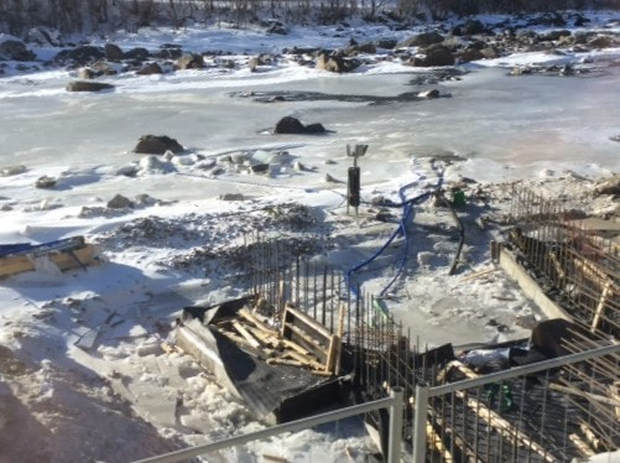 With the short days and long nights, it’s not hard to tell that winter is upon us. Weather conditions have rapidly gotten harsher and even the simplest tasks have seemed more difficult. Many projects will see snow and some will get rain. Winter is in full swing. Is your project ready for the season? During poor weather, production may be slowed, or even have to stop for safety reasons. Materials can’t be lifted in high winds. Workers have to take more frequent rest breaks when working at extreme temperatures and their movement could be hampered by cold weather or rain clothes. Concrete could take longer to set and reach sufficient strength to strip forms. Rain slows and even stops production. Storm-water can flood excavations, damaging equipment, causing excavations to collapse and generally delay construction work. Rain can penetrate partly completed buildings damaging finishes and equipment. Storm-water flowing from the project can erode away neighbouring properties, or deposit silt or contaminated material from your project site onto neighbouring properties. Preparing your project for winter. There is much to be done on projects while the weather is still good.
Milder climates Of course, some states are fortunate to have milder climates without rain and freezing temperatures. These cooler dry days offer opportunities to maximise productivity and progress. Ensure your crews make the most of the good weather. Conclusion ....Continue Reading..... This article was first published on the ClockShark website. To visit this website and continue reading the article click on the link above.
Please share this post To read more about the author’s books and find out where you can purchase them visit the pages on this website by clicking the links below:
To read more about the author visit the page 'Paul Netscher' Want to contact Paul Netscher please enter your details on 'Contacts' Find out how Paul Netscher can help you An introduction to construction variation claims. Video 11 - reasons to submit a variation claim. Apart from delay claims or extension of time claims discussed in video 6, often contractors suffer additional costs which they couldn’t have foreseen or allowed for when they priced the project.  Information in this video is from the author's easy to read books: 'Construction Claims: A Short Guide for Contractors' and 'Successful Construction Project Management: The Practical Guide' and 'Building a Successful Construction Company: The Practical Guide'. All available from Amazon in paper or ebook. 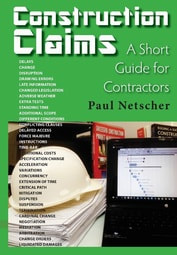 Get your copy of this easy to read book from Amazon. Available in eBook or paper Get your copy of this easy to read book from Amazon. Available in eBook or paper All too often, construction projects are finished late. Usually, the contractor is blamed. Contractors inevitably lose money because they are on the project longer than they planned to be. In addition, they are often penalised by the client for finishing late. But, is it always the contractor’s fault? Many of the delays experienced on a construction project are due to circumstances beyond the contractor’s control, which means that the contractor could have claimed an extension of time, usually including the additional costs that they incurred as a result of the delay. So why don’t contractors claim for these delays? Unfortunately, contractors often fail to submit delay claims because:
Contractors must learn to be more focused on the contractual issues as well as the construction work. Those who don’t understand their contractual rights will run into trouble, costing them money which could ultimately sink their company. The contract document is there to protect the client’s rights as well as the contractor’s rights, and no client can object to a contractor’s legitimate delay claim. Indeed, in the course of my career, I’ve been involved in over 120 projects for a multitude of different clients and many of these projects have involved variation and delay claims. Almost every one of these claims was settled amicably, even though some involved substantial increases to both the value and the time of the project. In nearly every case we went on to do further projects with the client. Of course, it is important that every delay claim is backed up by sound logic and information. Regrettably, some contractors only focus on submitting claims, often claims which are only desperate attempts to claw back time and money that has been lost due to their own mistakes. Many of these claims have no sound basis and are a waste of the contractor’s and the client’s time. In my next article, I’ll discuss some reasons the contractor can’t claim a delay for. When Can Contractors Claim for Additional Time? Contractors can claim for additional time when:
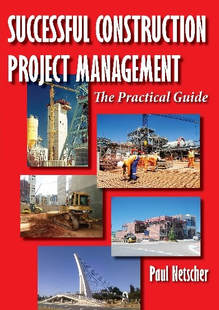 To read more about the author’s books and find out where you can purchase them visit the pages on this website by clicking the links below:
To read more about the author visit the page 'Paul Netscher' Want to contact Paul Netscher please enter your details on 'Contacts' Find out how Paul Netscher can help you An introduction to construction variation claims for construction project managers. Video 10 - Disruption Claims What is a disruption claim? Learn more.... 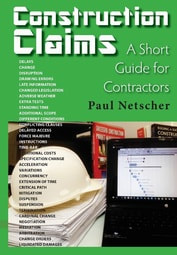 Information in this video is from the author's easy to read books: 'Construction Claims: A Short Guide for Contractors' and 'Successful Construction Project Management: The Practical Guide' and 'Building a Successful Construction Company: The Practical Guide'. All available from Amazon in paper or ebook. |
Archives
June 2024
Note: We welcome genuine comments, especially comments that add additional information to the subject matter in the article. We however reserve the right to remove inappropriate comments, which includes comments that have nothing to do with the subject, comments that include inappropriate language, and comments that are an advertisement for a product or company, or which include an advertising link. Comments must be in English. We will not enter into discussion on why a particular comment was removed.
CategoriesCopyright 2016 - The attached articles cannot be reproduced for commercial purposes without the consent of the author.
The opinions expressed in the attached articles are those of the writer. It should be noted that projects are varied and different laws and restrictions apply which depend on the location of the contractor and the project. It's important that the reader uses the supplied information taking cognisance of their particular circumstances. The writer assumes no responsibility or liability for any loss of any kind arising from the reader using the information or advice contained herein. "I have what I consider some of the best books on construction management."
Books are available from: Amazon.com Amazon.co.uk takealot.com kalahari.com Amazon.in Amazon.de Amazon.fr Amazon.it Amazon.com.au Powell's Fishpond uread bokus Amazon.ca Amazon.es Other retail stores Available in paperback or on Kindle "28 YEARS OF CONSTRUCTION PROJECT MANAGEMENT EXPERIENCE, DEVELOPING SUCCESSFUL CONSTRUCTION PROJECT MANAGERS AND BUILDING SUCCESSFUL CONSTRUCTION COMPANIES"
|

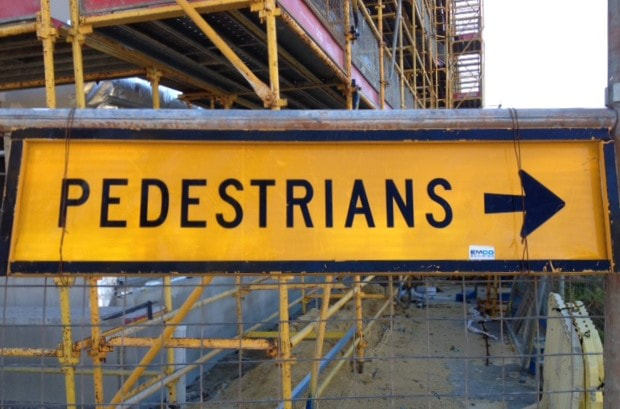
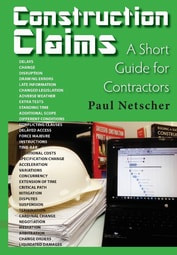
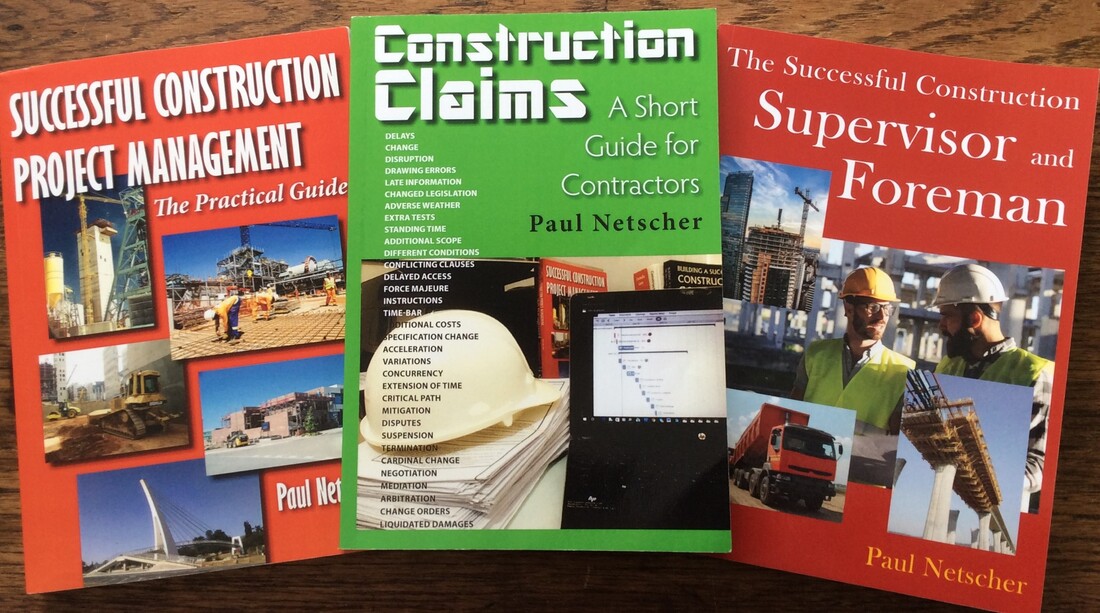



 RSS Feed
RSS Feed




